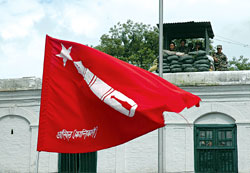|
|
Royalists loved to ridicule Girija Prasad Koirala as a havaldar lacking grace and sophistication. They love to look down at this arriviste bahun from Biratnagar. But that was yesterday, before the April Uprising and the republican wave swept the country. Now, even an unrepentant Kamal Thapa loyal henchman of the ex-Chairman-King calls Koirala a "statesman".
For those deeply suspicious of Maoist motives, Koirala is the last hope. All of a sudden, Koirala has turned from bad guy to good guy. This transformation is an object lesson in the degeneration of a mass leader in the process of a mismanaged political transition.
The hometown homilies delivered by Koirala over the last week make s one wonder whether it's the same person who stood resolute against all international pressure to take the People's Movement to its logical conclusion. In clear contravention of the eight-point and five-point agreements that he himself signed with the rebels, Koirala now ordains that Maoists can't be recognised as a political party unless they give up arms. Since containment of the Nepali Army and cantonment of Maoist combatants are proposed to be conducted simultaneously under UN supervision, the objective of the geriatric premier's outbursts defy logic.
In any case, the transitional government itself is of indeterminate legitimacy. The premier of a caretaker government lacks the moral authority to raise questions over the legality of a group that has directly or indirectly contributed to the success of the political campaign that put him back in Baluwatar in the first place. Perhaps the premier realised the faux pas and then raised questions over the very desirability of a transitional statute. Unfortunately, that turned out to be yet another controversial statement that opened an even stinkier can of worms.
In the absence of an interim constitution, the validity of every parliamentary pronouncement and the government remains open to judicial review of the Supreme Court. In fact, the court has already drawn appropriate conclusions from the premier and registered cases that were earlier denied permission for constitutional hearing.
It can be argued that other than the doctrine of necessity, the appointment of Girija Prasad Koirala as the leader of a restored parliament and prime minister have no legal validity. Post-facto recognition can only be conferred upon him through an interim statute that he now feels is unnecessary. No wonder even as mild-mannered a person as Laxman Aryal, convener of the interim constitution drafting committee, was incensed enough to denounce Koirala's remarks. The government and the rebel negotiating team are to receive a draft of the interim constitution on Friday. What they do with it will determine the pace of the peace process.
The Maoist leadership isn't handling the transitional hiccups any better. Its cadres prowl the countryside as if there was no administration, no government, and no law in the land. Such an attitude isn't rebellion, it's anarchy. Armed guerrillas acquire respect only when they begin to respect the life, liberty, and property of the common citizenry. This is something that Pushpa Kamal Dahal and his cohorts must impart to their cadres.
However, the misdemeanours of the guerrillas do not free the government of its obligation of bringing them into the mainstream. One of the unmistakable messages of the miscarried Rhododendron Revolution was an endorsement of rapprochement between the seven party alliance and the Maoists to establish sustainable peace and enduring democracy in the country.
By listening too keenly to conflict resolution experts swarming all over the place, the government seems to be falling into the trap of those who don't want to see the safe-landing of the Maoists. Meddling by minders is perhaps the root cause of the stalled peace negotiations.
In informal conversations, then US Ambassador Michael Malinowski used to say that there were only two people in Nepal who couldn't be swayed by what foreign envoys said: King Gyanendra and Premier Koirala. At some point, King Gyanendra began listening to Malinowski's successor and gambled on his support for his February First adventure. The result of that miscalculation is clear for all to see. History will be less forgiving of Koirala if he persists with his new-found love for the international community.




